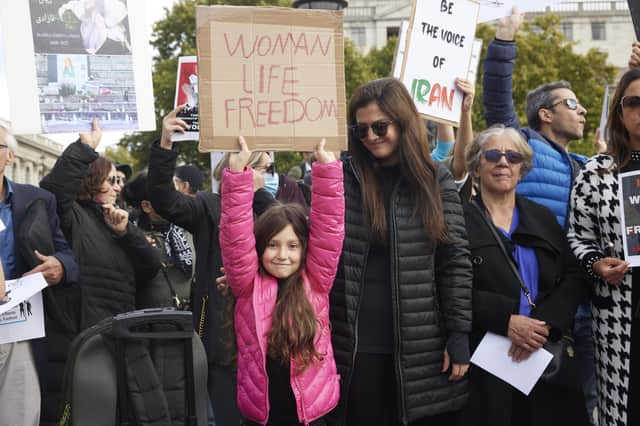From Iran to Malawi to Scotland, women are angry. Here are just a few reasons why – Susan Dalgety


A decade ago, the same poll showed that men and women reported anger and stress at the around the same levels. Today, women are angrier than men by a significant margin of six points. In India and Pakistan, the anger gap is 12 per cent.
Why are women angry, I hear you ask? Surely men have as much reason to be fed up? The cost-of-living crisis affects them too. Men suffered badly during the worst of the pandemic, just as we did. Have you seen the price of a pint recently? You won’t get much change from a fiver. And Scotland didn’t qualify for the World Cup. It’s not much fun being in a bloke in 2022, you know.
Advertisement
Hide AdAdvertisement
Hide AdIt's even less fun being a woman, so gather round and I will tell you why women are angry. I promise I won’t shout, much, but I may employ some deep sarcasm and some of you may even detect a slight nagging tone. But I promise I WON’T SHOUT. Much.
Women are angry because, despite decades of feminist campaigning, women are still poorer than men. According to Close The Gap, the pay gap between men and women remains a “persistent feature of the Scottish labour market”. It currently sits at ten per cent.
There may be more well-paid women doctors in the UK than ever before, but who is it that looks after our elderly population, providing social care for less than ten pounds an hour? Why, women of course. Older women at that. Eight out of ten social care staff in Scotland are female, and nearly half are over 44.
And across the world, women still do the bulk of unpaid labour – a staggering 11 billion hours a day. The hard work that keeps every household ticking over, from cooking to childcare, even buying Christmas presents, is done by women.
In return for our hard labour, what do we get? We get harassed on the street. Choked during sex. Raped by strangers. Punched in the face by men who say they love us. Murdered in front of our children.
In the USA, millions of women have just been told by the highest court in the land that they are not entitled to have control over their own bodies, with abortion now banned in at least 13 states. In Iran, women are being executed by the state for daring to rip off their hijab. And across the world, there are 129 million girls out of education.
I messaged Maggie Banda, my friend and colleague in Malawi – one of the world’s poorest countries – to ask her what made women angry there. She didn’t hesitate. “Women are angry because poverty is a female issue. As our economy plunges, it is women that are bearing the burden. It is women who take care of the sick, who fetch water, grow maize, look after the children."
“And what makes me really angry is the lack of progress, despite changing governments,” she added – without shouting.
Advertisement
Hide AdAdvertisement
Hide AdIt is this slow rate of progress, whether in sub-Saharan Africa or Europe, that makes women sizzle with rage. Two generations after women burned their bras in protest, the sexism that keeps women in poverty and the misogyny that kills us persists. Even our anger is perceived differently: angry men are powerful, strong, determined, angry women are shrill, nasty, nippy even.
Most worryingly, many young women recoil from describing themselves as feminists because they associate it with grumpy old women. But we no longer care what men – or their handmaids – think. WE HAVE HAD ENOUGH.
Whether it is women across Scotland organising to protect their daughters’ sex-based rights in the face of gender ideology or women in India cutting their hair in solidarity with their sisters in Iran, women are fighting back. Women’s anger is fuelling a new wave of feminism. Not a feminism curated from academic texts and nurtured in coffee shops and on Instagram, but a raw, angry feminism with its roots in real life.
Women are fed up nursing their wrath at home and have taken to the streets in protest. They are lobbying governments. Drafting women’s manifestos. Starting petitions. Joining – or leaving – political parties. Women who have never raised their voice in anger are now screaming in fury at how societies – whether Scotland or Malawi, Arkansas or Tehran – continue to belittle women.
Every civil rights movement, from the Suffragettes fighting for a woman’s right to vote to the recent farmers’ protest in India, has been fuelled by anger. Women’s rights campaigners are no different. “You need rage and anger," Ginette Azcona at UN Women told the BBC. "Sometimes you need these, to shake things up – and have people pay attention and listen."
Whether women’s righteous anger will be heard by those in power remains to be seen. Those with a vested interest in maintaining the status quo – from career politicians to government-funded activist groups – may try to dismiss female anger as nothing more than hormonal rage, whipped up by a few cynical campaigners.
But they will ignore women at their own peril. Women are angry the world over, and we are asserting our truth. That we are worthy of respect, that our views are valid, that we are equal to men, that we have had enough. AND WE ARE NOT GOING AWAY!
Comments
Want to join the conversation? Please or to comment on this article.